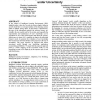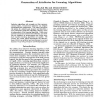29 search results - page 5 / 6 » The Politeness Effect: Pedagogical Agents and Learning Gains |
AAI
2002
13 years 5 months ago
2002
We present a probabilistic model to monitor a user's emotions and engagement during the interaction with educational games. We illustrate how our probabilistic model assesses...
ICALT
2003
IEEE
13 years 10 months ago
2003
IEEE
In the context of Intelligent Learning Environments (ILE), adaptivity plays a key role. In order to achieve adaptive behavior an ILE should have a rich representation of the learn...
FLAIRS
2009
13 years 3 months ago
2009
In this paper, we investigate the hypothesis that plan recognition can significantly improve the performance of a casebased reinforcement learner in an adversarial action selectio...
AGENTS
2001
Springer
13 years 9 months ago
2001
Springer
Autonomous robots, such as robot office couriers, need navigation routines that support flexible task execution and effective action planning. This paper describes XFRMLEARN, a s...
AAAI
1996
13 years 6 months ago
1996
Inductive algorithms rely strongly on their representational biases, Constructive induction can mitigate representational inadequacies. This paper introduces the notion of a relat...


